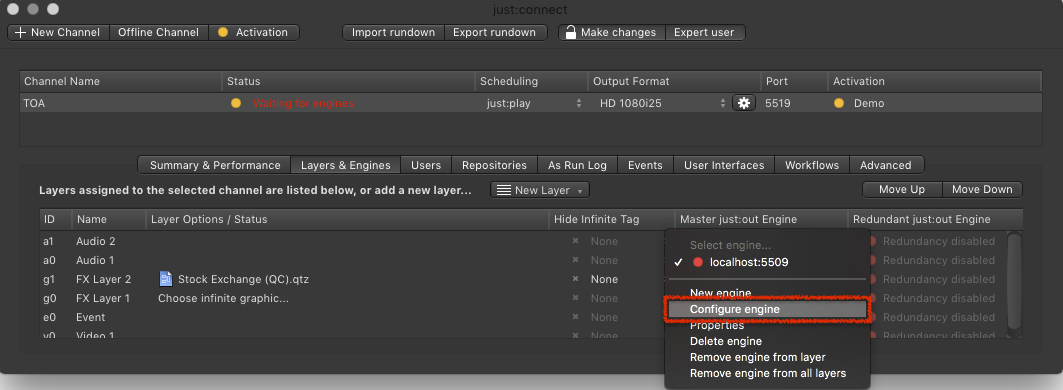13.13 Configuring Optional RTMP Streaming Output (v2.5)
It is possible to send the Video, Graphics and the Closed Captioning data (availability depending on the CDN) generated by the just:out engine as an H.264 compressed RTMP stream to a CDN running a Wowza server. This is useful in situations where the output should be published on the internet.
Live incoming signals which are passed through using the DSK-based method will NOT be part of the RTMP stream. Only when using the non DSK-based method, the Live Signal will be streamed to the CDN. In any case - make sure to have a valid live signal attached to the video in connector of the video device. Please refer to chapter 5. Live Signal Handling.
- To configure the RTMP streaming, select the Channel in the Channel View
- Activate the Layers & Engines tab.
- Select an existing engine and choose Configure engine.
- The Engine Configuration window appears. Click on the Streaming Output tab.
- User/Password: Insert the user name and password here. This information must be provided by the CDN.
- URL: Insert the URL of your streaming server account here. This information must be provided by the CDN.
YouTube
Type in the stream URL a.rtmp.youtube.com/live2/ followed by the 16 digit Stream name/key xxxx-xxxx-xxxx-xxxx as the destination, to connect to a YouTube Live channel. The resulting string shown in the UI would then be: rtmp://a.rtmp.youtube.com/live2/xxxx-xxxx-xxxx-xxxx
2.H.264 Video: Configure the H.264 compression accordingly to the recommendations of your CDN.
3.AAC audio: Configure the audio output accordingly to the recommendations of your CDN.
Start with a lower resolution and a lower bitrate and adjust the quality later if needed. Overloading the computer by using high resolutions or bit rates it can not deliver can cause any kind of issues, like dropped frames and destroyed audio.
- The Video output format of the stream is always progressive, i.e. if just:out is configured to play interlaced Video, it will be de-interlaced.
- We recommend to send the highest possible quality to the streaming server. With the proper options enabled, the streaming server will then recompress and reformat the signal to make the stream useable for different kinds of distribution. Please contact your CDN if you are unsure which options the CDN streaming server supports.

